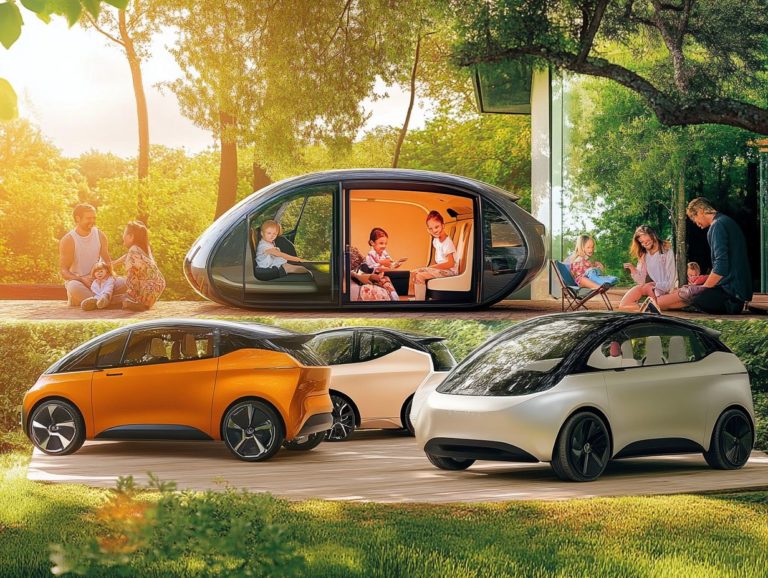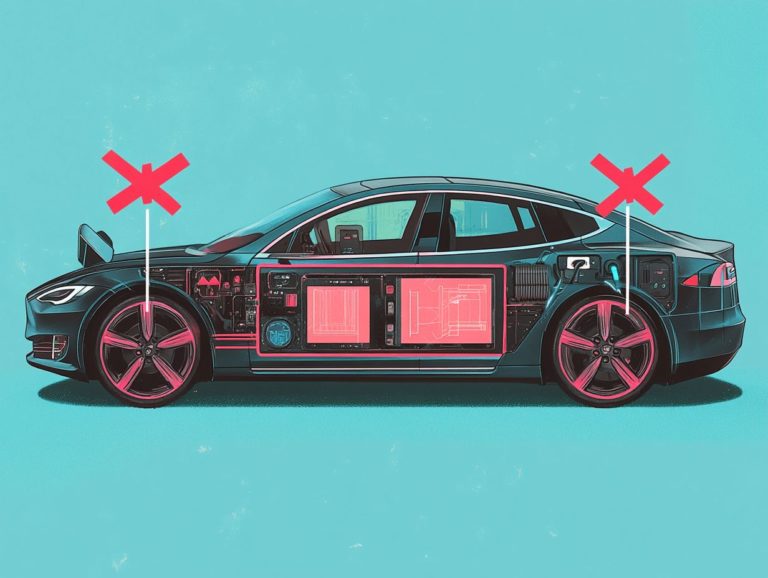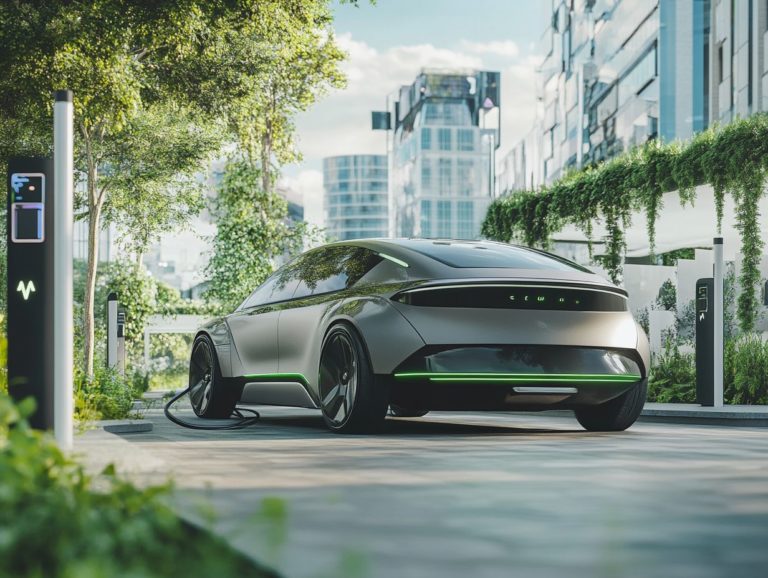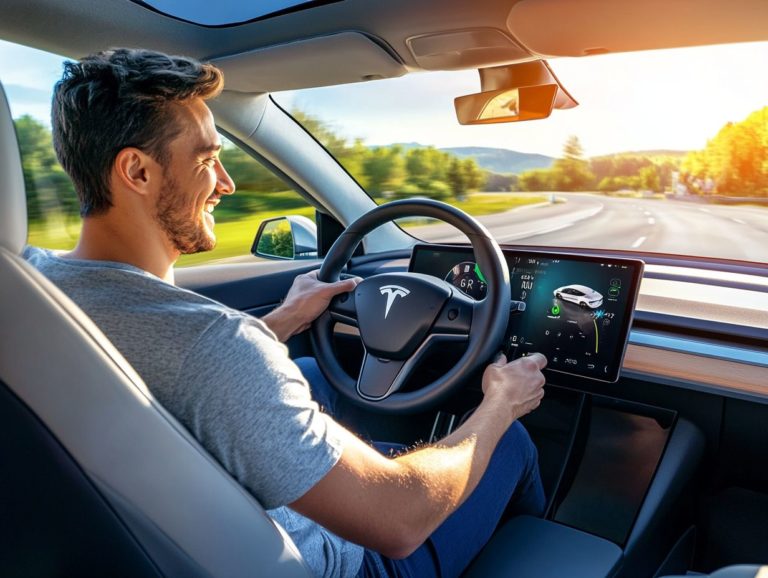5 essential features for your next electric car
As electric vehicles continue to change the car market, selecting the perfect one can feel daunting.
With rapid advancements in technology and an increasing emphasis on sustainability, it’s vital for you to understand what to prioritize in your next electric car. Discover five must-have features that will transform your driving experience!
- Impressive battery life
- Fast charging capabilities
- Advanced safety features
- An intuitive infotainment system
- Sustainable materials that enhance your driving experience
You’ll also learn about the different types of electric cars, debunk common misconceptions, and discover the environmental benefits they offer. We will also cover government incentives and key considerations to think about before making your purchase.
Get ready to explore amazing possibilities and see how an electric car can seamlessly fit into your lifestyle!
Contents
- Key Takeaways:
- 1. Long Battery Life
- 2. Fast Charging Capability
- 3. Advanced Safety Features
- 4. User-Friendly Infotainment System
- 5. Sustainable Materials Used in Production
- What Are the Benefits of Owning an Electric Car?
- Frequently Asked Questions
- What are the 5 essential features for my next electric car?
- Why is range an important feature for an electric car?
- What should I look for in terms of charging infrastructure?
- How does performance differ in an electric car compared to a traditional car?
- What safety features should I expect in an electric car?
- How does technology play a role in an electric car?
Key Takeaways:
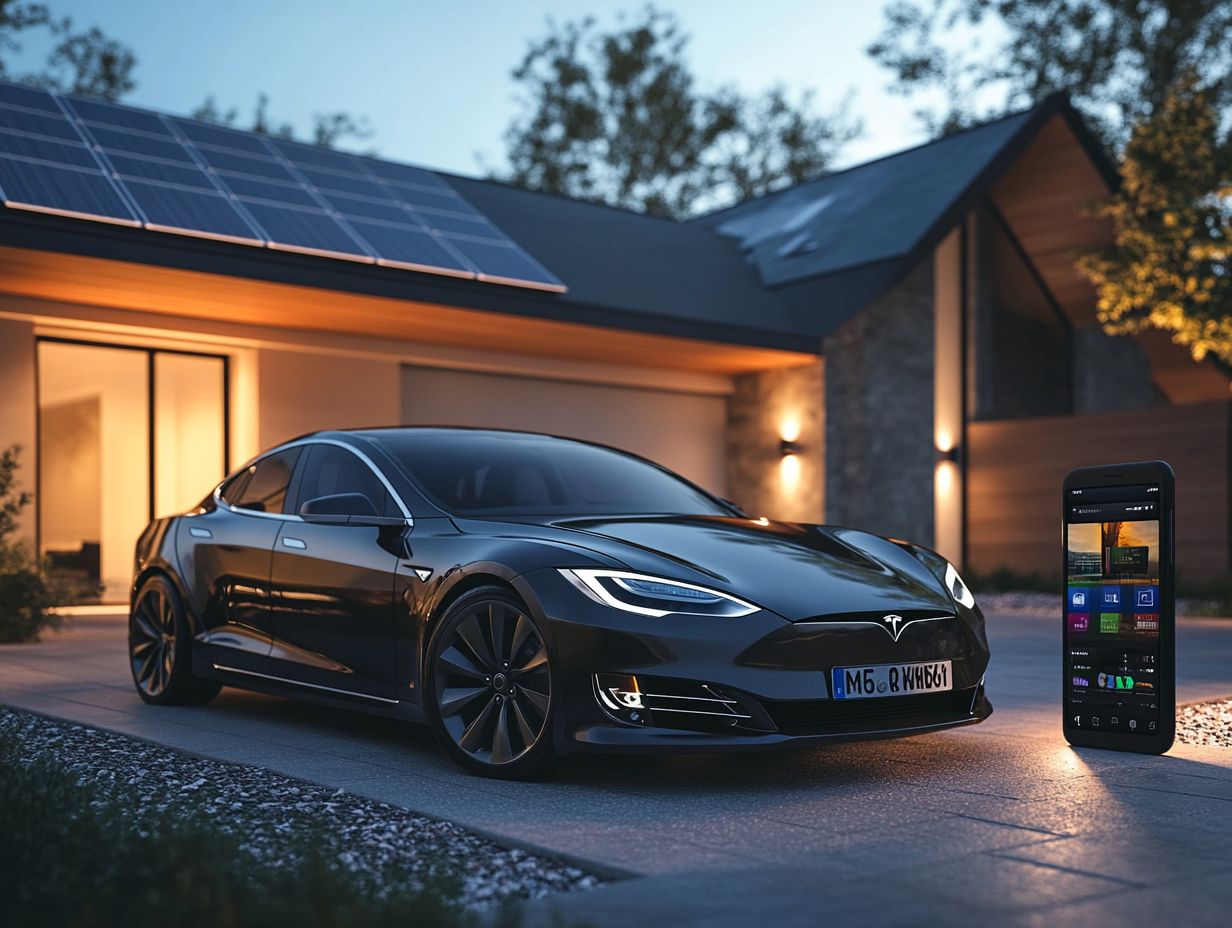
- Choose an electric car with a long battery life! Enjoy the freedom of driving further without worrying about charging often.
- Select a model with fast charging capability to minimize downtime and ensure convenience on long trips.
- Prioritize advanced safety features in your electric car for added protection and peace of mind on the road.
1. Long Battery Life
Long battery life stands out as one of the most appealing features of modern electric vehicles (EVs). With advancements in battery technology, especially a type of battery commonly used in electric cars, these vehicles offer an impressive range for both urban commutes and long-distance excursions, easing concerns about range anxiety.
Automakers like Tesla, Hyundai, and Rivian are changing the driving experience through sophisticated battery management systems. These advancements allow you to embark on eco-friendly adventures without sacrificing performance or acceleration. This extended range enables longer trips without the worry of finding a charging station, making journeys to remote destinations much more practical.
For example, the Tesla Model S boasts a range of over 400 miles on a single charge, while the Hyundai Kona Electric and Rivian R1T deliver exceptional efficiency that aligns perfectly with an active lifestyle.
Effective battery management systems are crucial to this performance. They ensure your battery operates within safe parameters, enhancing not only performance but also longevity. By monitoring factors such as temperature, charge cycles, and overall health, these systems optimize energy use, enriching your driving experience while promoting sustainability.
2. Fast Charging Capability
Fast charging capability is a cornerstone of the electric vehicle revolution. It enables you to swiftly recharge your EV at public stations equipped with cutting-edge chargers, such as those delivering 250 kW. This ensures that your eco-conscious journeys remain convenient and efficient.
This technology isn t just a game changer for long road trips; it also significantly enhances the practicality of owning an electric vehicle. Home charging solutions, like Level 2 chargers, provide a seamless way to recharge overnight, allowing you to establish a flexible charging routine that fits your lifestyle perfectly.
The expansion of charging infrastructure boosts your confidence in electric vehicles, effectively easing concerns about range anxiety. Industry leaders, including Tesla and Volkswagen, are at the forefront of fast charging technologies and networks, making it more accessible than ever for you to consider making the switch to electric vehicles.
3. Advanced Safety Features
Advanced safety features in electric vehicles are carefully designed to elevate both safety and comfort.
With cutting-edge technology like advanced driver-assistance systems (ADAS), you can venture into eco-friendly trips with an added layer of peace of mind.
These systems include a suite of impressive features, such as:
- Collision avoidance technology that uses sensors and cameras to help you steer clear of potential accidents.
- Lane-keeping assistance that ensures you stay centered in your lane, improving your drive.
- Automated emergency braking that reacts swiftly to apply the brakes and help you avoid collisions entirely.
Manufacturers like Tesla, Hyundai, and BMW are setting new road safety standards. You can drive confidently, knowing you have advanced safety features at your fingertips.
4. User-Friendly Infotainment System
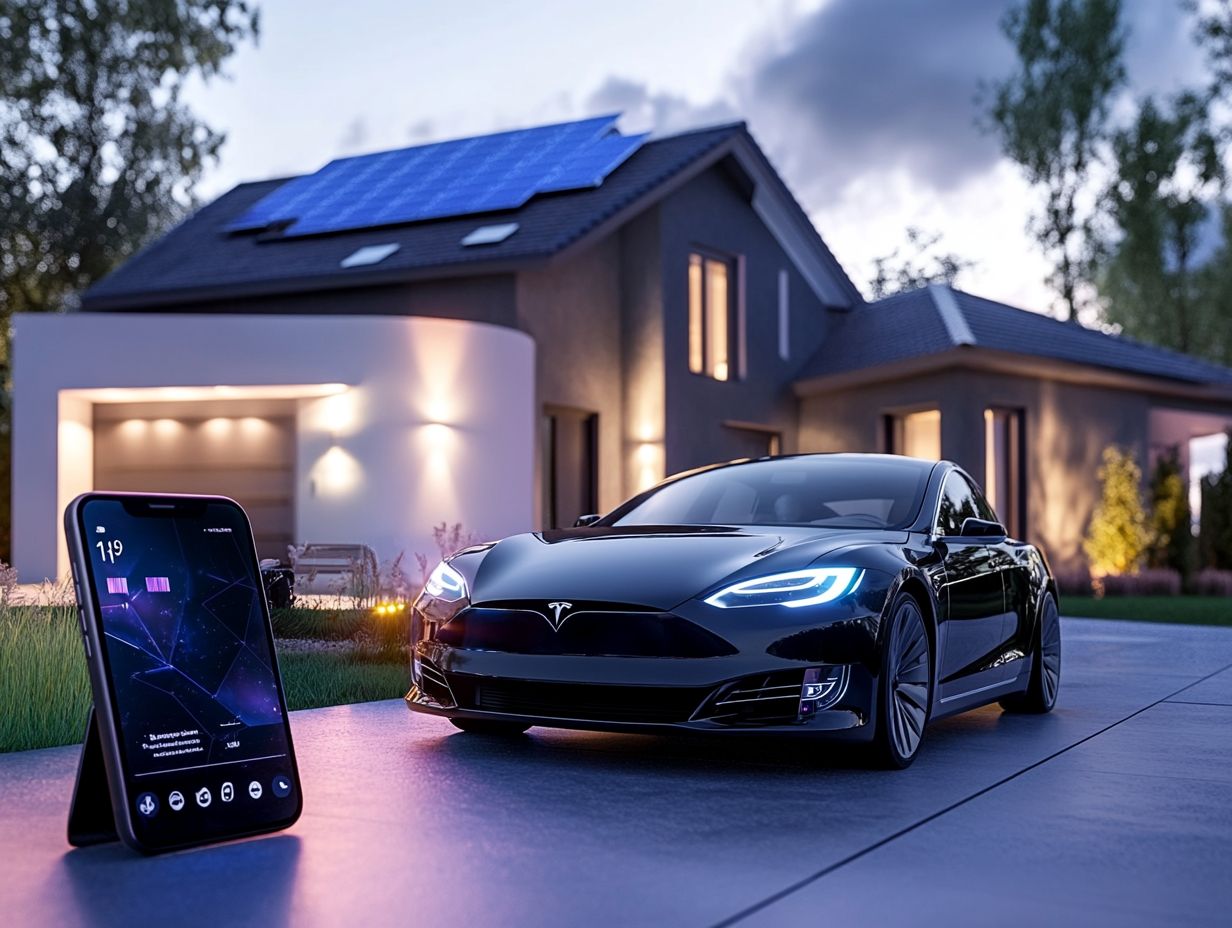
User-friendly infotainment systems in modern electric vehicles seamlessly integrate smart, connected features that enhance your driving experience.
By leveraging cutting-edge technology, these systems ensure that you and your passengers enjoy unparalleled connectivity and functionality.
These systems offer easy navigation, helping you find efficient routes and charging stations. They also support music streaming services, boosting your in-car entertainment.
Robust vehicle diagnostics provide real-time feedback on battery health and performance metrics, enabling you to make informed decisions during your journeys.
By marrying convenience with sustainability, these infotainment systems play a vital role in supporting your eco-conscious adventures, transforming the way you interact with both your vehicle and the environment.
5. Sustainable Materials Used in Production
The use of sustainable materials in electric vehicle production showcases a growing commitment to creating a sustainable alternative that minimizes environmental impact.
Using recycled aluminum and bioplastics reduces waste and lowers emissions from traditional manufacturing methods.
You ll discover that utilizing sustainably sourced fibers for interiors enhances the overall aesthetic appeal. As eco-conscious consumer demand rises, many automakers are prioritizing sustainability, clearly illustrating a shift toward a greener future in the automotive industry.
What Are the Benefits of Owning an Electric Car?
Owning an electric vehicle (EV) provides many benefits that cater to your needs and the environment, from a reduced ecological footprint to an enhanced driving experience, complete with safety and comfort features that redefine transportation.
One of the most enticing advantages is the significant cost savings you can enjoy over time. Electric cars typically have lower fuel costs compared to gasoline counterparts, as electricity tends to be more affordable. You can also access various tax incentives and rebates, making that initial purchase feel much more manageable.
These financial perks align perfectly with the rising consumer trend toward sustainability, as you seek to minimize your carbon footprint. Let s not forget that EVs generally require less maintenance thanks to fewer moving parts, translating into long-term savings for you.
This mix of savings and eco-friendliness matches today s values that champion responsible consumption and eco-friendly living.
What Are the Different Types of Electric Cars Available?
The electric vehicle (EV) market is vibrant, offering a variety of options from manufacturers like Tesla, Hyundai, Kia, and Rivian. Each brand presents unique models, including the 2024 Tesla Model 3 and the 2024 Hyundai Kona Electric, alongside luxury contenders such as the Porsche Taycan and Lucid Air.
You ll find compact cars ideal for urban driving, striking a balance between efficiency and style think Nissan Leaf and Ford Mustang Mach-E.
If luxury is your pursuit, there are electric vehicles that blend high-end features with remarkable performance. The Audi e-tron and BMW i4 are excellent choices for those who appreciate the finer things in life, but consider exploring the 5 leading electric vehicle models for families for even more options.
For families and adventure seekers, electric SUVs offer spaciousness and versatility, with standout models like the Rivian R1S and Volkswagen ID.4.
Each category addresses specific consumer desires while showcasing cutting-edge technology and a commitment to sustainability, making them attractive choices in today s automotive landscape.
What Are the Common Misconceptions About Electric Cars?
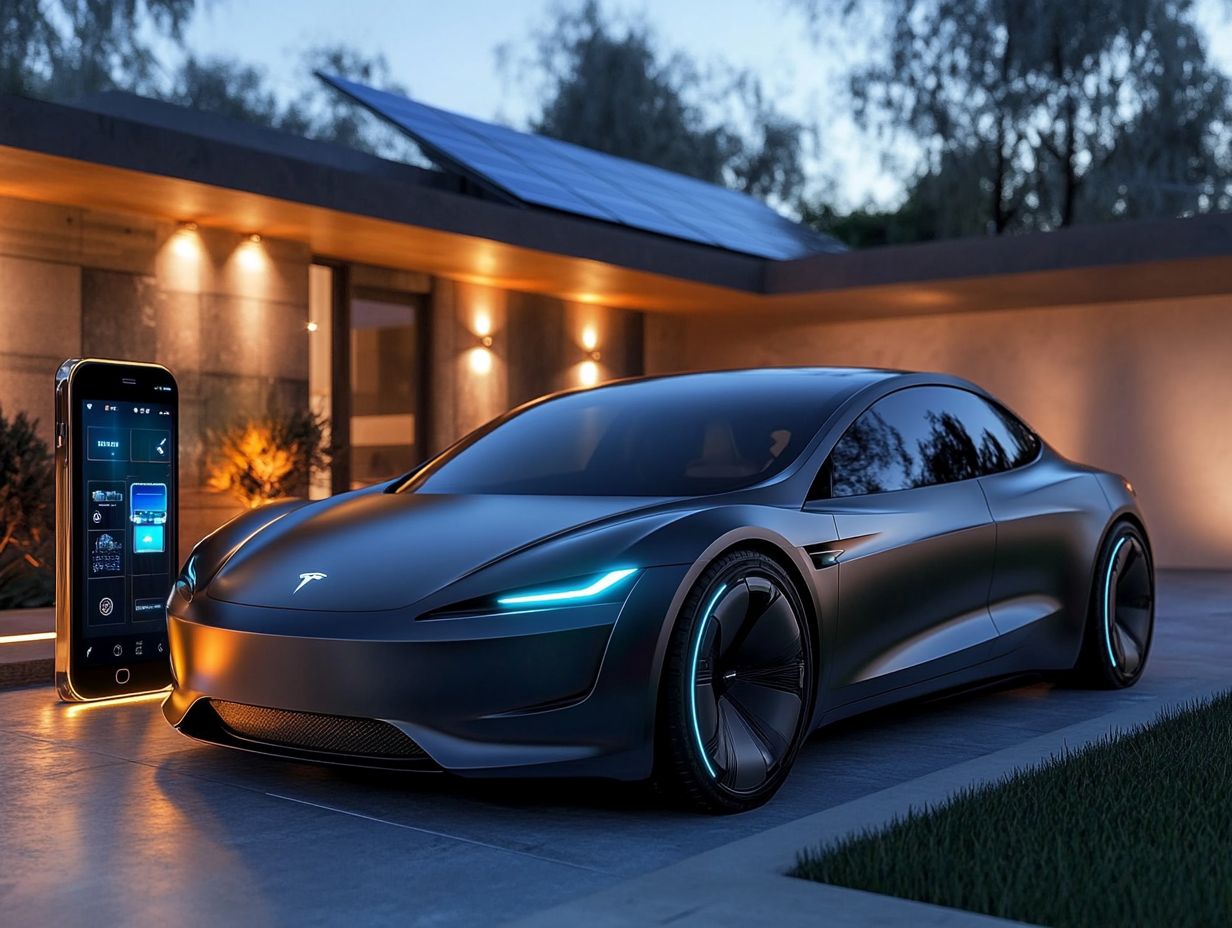
Common misconceptions about electric vehicles (EVs) often arise from misunderstandings about range anxiety, battery technology, and performance capabilities.
Many believe that EVs can’t handle long distances without constant recharging. However, advancements have led to models that can travel over 300 miles on a single charge.
The charging infrastructure is rapidly expanding, making it convenient to recharge during long trips. Concerns about charging times are becoming outdated, as many modern EVs can achieve an 80% charge in under 30 minutes with fast chargers.
Many now realize that electric vehicles can outperform traditional gas-powered cars. With advancements in electric motor technology, these vehicles offer instant torque and impressive acceleration, often leaving their gasoline counterparts behind.
How Can Electric Cars Help Reduce Carbon Footprint?
Electric vehicles provide a sustainable alternative that can significantly reduce your carbon footprint, aligning with eco-conscious transportation choices.
By using electricity as a power source, these vehicles eliminate the tailpipe emissions associated with traditional gasoline or diesel-powered cars.
To fully appreciate the environmental benefits of electric vehicles, consider their entire lifecycle, from manufacturing to end-of-life disposal. This includes recognizing the role of renewable energy sources, such as solar and wind, in powering the charging infrastructure.
When the electricity fueling your electric vehicle comes from sustainable sources, the carbon emissions tied to its operation decrease even further, fostering a greener transportation ecosystem.
What Are the Government Incentives for Owning an Electric Car?
Government incentives for owning electric vehicles (EVs) have become essential, especially with initiatives from the Biden-Harris administration promoting eco-conscious transportation.
These initiatives offer financial benefits designed to make the transition to electric vehicles more appealing. Tax credits can significantly lower the upfront cost, while rebates provide immediate cash incentives to ease your expenses.
Additionally, grants are available for individuals installing home charging stations and for organizations enhancing EV infrastructure.
By implementing these programs, the administration aims to remove barriers to entry and accelerate the transition to sustainable transportation, creating a cleaner environment and reducing reliance on fossil fuels.
Explore your options today and join the eco-friendly movement!
What Should You Consider Before Purchasing an Electric Car?
Before purchasing an electric vehicle (EV), consider several factors. Key aspects include charging options, battery technology, and staying informed about 5 important electric vehicle milestones in 2024, as well as the performance of different models.
Don t overlook the availability of charging infrastructure in your area. This can significantly influence your daily usability and ease of long-distance travel.
Evaluate the overall costs associated with owning an EV like the initial purchase price, maintenance expenses, and any available incentives. This will give you a clearer picture of your investment.
Consider the unique features of different electric models. Advanced safety systems and infotainment options, along with insights into the best electric vehicle features of 2024, can help you find the ideal vehicle.
Frequently Asked Questions
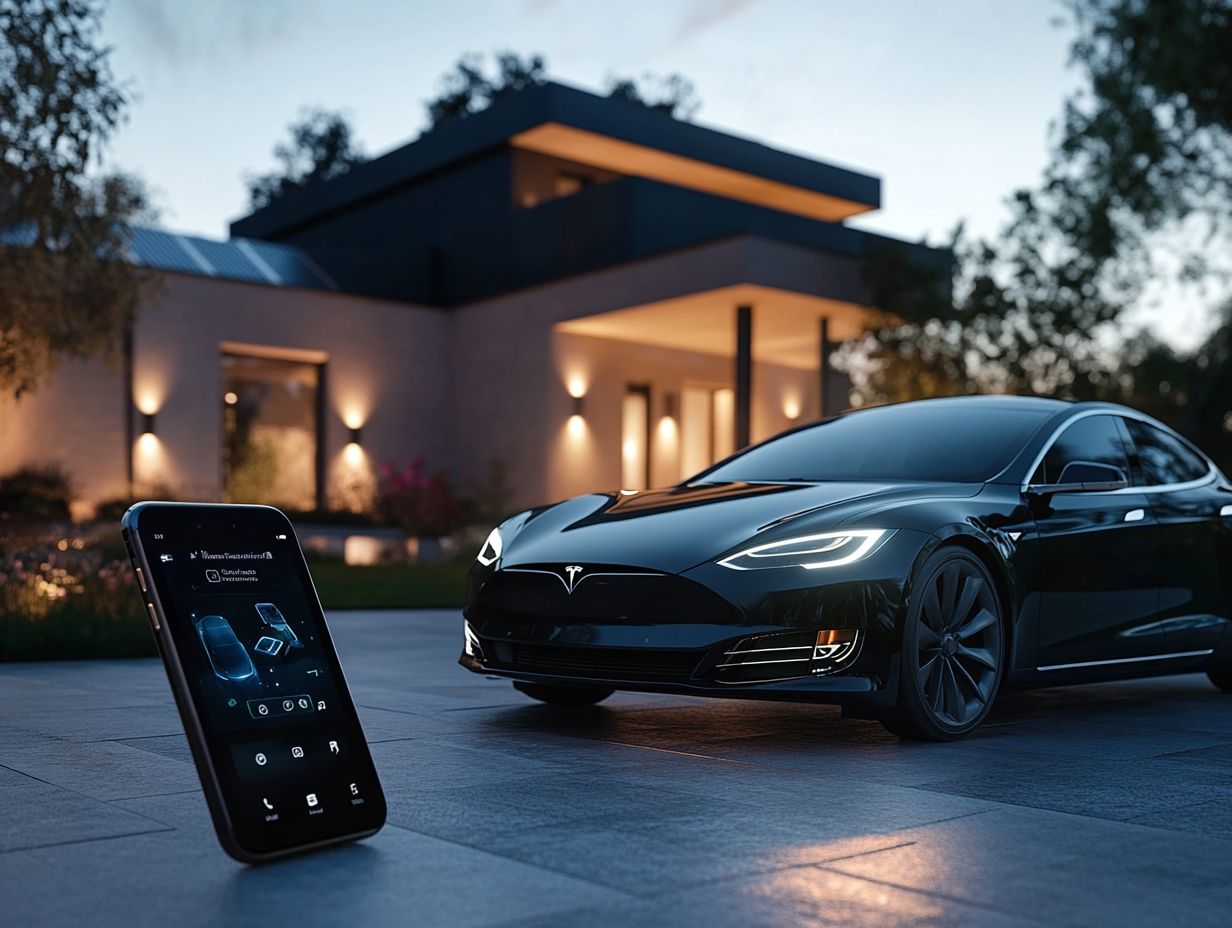
What are the 5 essential features for my next electric car?
The 5 essential features for your next electric car are: range, charging infrastructure, performance, safety, and technology.
Why is range an important feature for an electric car?
Range matters because it determines how far you can drive on a single charge. A longer range means less frequent charging stops and more convenience for longer trips.
What should I look for in terms of charging infrastructure?
When considering charging infrastructure, look for a car with fast-charging capabilities and a wide network of charging stations, including both at-home options and public charging stations.
How does performance differ in an electric car compared to a traditional car?
Performance in an electric car is often superior to a traditional car due to the instant torque and smoother acceleration provided by electric motors. Additionally, electric cars have a lower center of gravity, making them more agile and responsive.
What safety features should I expect in an electric car?
Important safety features to look for in an electric car include advanced driver assistance systems, such as lane-keeping assist and automatic emergency braking, as well as a strong and sturdy battery pack to protect against impacts. Additionally, considering notable electric vehicles in 2024 can help you make an informed choice.
How does technology play a role in an electric car?
Technology is crucial in an electric car. Look for features such as regenerative braking, which captures energy while slowing down, smartphone integration, and advanced infotainment systems. Additionally, consider the essential features in EV chargers, as some electric cars even offer over-the-air updates, allowing for continuous improvement and new features.
Ready to explore your options? Start your journey towards a more sustainable future with an electric car today!



